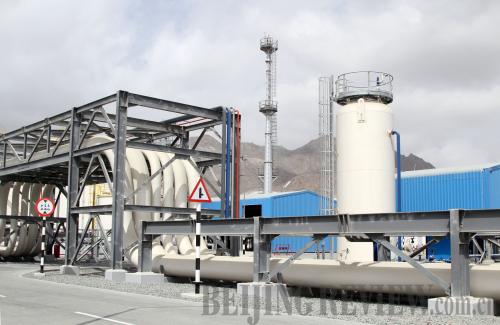|
 |
|
FINISHING TOUCHES: An oil storage project invested in by Sinomart KTS Development Ltd., a subsidiary of Sinopec Group, is completed in Fujairah Free Zone, United Arab Emirates, on March 11. The project, Fujairah Oil Terminals FZC (FOT), consists of a 1.17-million-cubic-meter oil storage facility. It is Sinopec's first overseas joint venture oil storage project (LI ZHEN) |
Inflation Quickens
China's consumer price index (CPI), the main gauge of inflation, grew 1.4 percent year on year in February, the National Bureau of Statistics (NBS) said on March 10.
The stronger-than-expected reading grew from the 0.8-percent gain in January, the lowest level in more than five years.
NBS statistician Yu Qiumei attributed the recovery to rising food and travel prices during the Chinese Spring Festival holiday (February 18-24). Distortions caused by the timing of the Spring Festival, which fell on January 31 in 2014 but on February 19 in 2015, also played a part, the NBS explained.
Food prices, which account for nearly one third of weighting in China's CPI, increased 2.4 percent year on year in February.
China's producer price index (PPI), which measures wholesale inflation, plunged 4.8 percent year on year in February, marking its 36th straight month of decline and pointing to continuing weak market demand.
The factory-gate price decline deepened from January's 4.3 percent and December's 3.3 percent, and posted its steepest fall since March 2012 when the index embarked on a downward trend, according to the NBS.
However, on a monthly basis, the PPI contracted 0.7 percent in February, narrowing from a 1.1-percent fall in January.
Yu attributed the slower monthly decline to an improvement in the factory-gate prices in oil processing, chemical and non-ferrous metal industries.
Trade Rebound
China's trade rebounded in February from the previous month's surprise contraction, but imports were subdued in another sign of continued weakness in the world's second largest economy.
Exports surged 48.3 percent in February from a year earlier, reversing the 3.3-percent decline in January. However, imports plunged by 20.5 percent, steeper than the previous month's 19.9-percent fall, according to data from the General Administration of Customs (GAC).
February exports amounted to $169.19 billion, while imports added up to $108.57 billion, resulting in a widening trade surplus of $60.62 billion.
China lowered its annual foreign trade growth target to around 6 percent for 2015 from the 7.5-percent goal set for 2014.
Merger On Track
High-speed rail manufacturers China North Railway (CNR) and China South Railway (CSR) announced that their merger had passed overseas antitrust scrutiny.
Antitrust regulators—in this case, in Australia, Germany, Pakistan and Singapore—have approved the merger with no additional conditions or obligations attached, according to a statement released by the two companies in the Shanghai Stock Exchange on March 10.
The approvals mean the two firms' overseas projects will not be affected by the merger, according to the statement.
On March 9, the two companies announced that the merger plan had been approved in the general meetings of both sets of shareholders. The plan includes a new company name, stock swap agreement and personnel settlement.
The companies announced the merger plan last December, aiming to build a new provider of high-end railway equipment. The deal will help China's high-speed rail go global and avoid competition between the two. The pair will merge into a new company, which will inherit both companies' assets, liabilities, businesses, staff, contracts, certificates as well as all other rights and obligations.
The State-Owned Assets Supervision and Administration Commission of the State Council agreed to the merger on March 5. The merger is still subject to review by authorities including the China Securities Regulatory Commission and the Ministry of Commerce.
| 